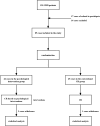The influence of psychological intervention-assisted cardiac rehabilitation on kinesiophobia in individuals diagnosed with coronary heart disease
- PMID: 40495983
- PMCID: PMC12149134
- DOI: 10.3389/fcvm.2025.1561505
The influence of psychological intervention-assisted cardiac rehabilitation on kinesiophobia in individuals diagnosed with coronary heart disease
Abstract
Objective: Kinesiophobia is prevalent among patients with coronary heart disease (CHD). This study aimed to explore whether psychologically-informed cardiac rehabilitation (CR) could positively influence the reduction of kinesiophobia in CHD patients.
Methods: A total of 86 CHD patients, who sought treatment at Bethune International Peace Hospital between June 2022 and June 2023, were selected and divided into two groups: a psychological intervention group comprising 42 patients and a conventional CR group of 44 patients. The conventional CR group received standard CR intervention, whereas the psychological intervention group underwent CR intervention augmented with psychological support. The effectiveness of these interventions was evaluated using the Self-Rating Depression Scale (SDS), the Self-Rating Anxiety Scale (SAS), the Multidimensional Exercise Self-Efficacy Scale (MSES), the TSK-Heart (for assessing kinesiophobia in cardiac patients), and the Short Form Health Survey (SF-36) scores.
Results: Following the intervention, the SDS and SAS scores of the psychological intervention group were higher than those of the conventional CR group. The MSES dimension scores and the total score of the psychological intervention group were elevated in comparison to the CR group. Conversely, the TSK-Heart dimension scores and the total score of the psychological intervention group were diminished relative to the CR group. Additionally, the SF-36 dimension scores and total score of the psychological intervention group surpassed those of the CR group post-intervention.
Conclusion: The integration of psychologically-supported CR into the rehabilitation regimen for CHD patients effectively mitigates negative emotions, enhances self-efficacy, and markedly reduces kinesiophobia, thus significantly improving overall quality of life.
Keywords: cardiac rehabilitation; coronary heart disease; kinesiophobia; psychological intervention; quality of life.
© 2025 Guo, Li, Sun and Ma.
Conflict of interest statement
The authors declare that the research was conducted in the absence of any commercial or financial relationships that could be construed as a potential conflict of interest.
Similar articles
-
The effect of cardiac rehabilitation on kinesiophobia in patients with coronary artery disease.Turk J Phys Med Rehabil. 2021 May 25;67(2):203-210. doi: 10.5606/tftrd.2021.5164. eCollection 2021 Jun. Turk J Phys Med Rehabil. 2021. PMID: 34396071 Free PMC article.
-
Exploring the causes of elevated kinesiophobia in post-coronary stenting patients: a qualitative analysis in a cardiac rehabilitation setting.BMJ Open. 2025 May 14;15(5):e090796. doi: 10.1136/bmjopen-2024-090796. BMJ Open. 2025. PMID: 40374223 Free PMC article.
-
The Combined Effects of Cardiac Rehabilitation Exercise Training and Mindfulness Care on Post-PCI Rehabilitation in Coronary Heart Disease Patients.Altern Ther Health Med. 2024 Jun 21:AT10719. Online ahead of print. Altern Ther Health Med. 2024. PMID: 38904635
-
Improving the Effectiveness of Psychological Interventions for Depression and Anxiety in Cardiac Rehabilitation: The PATHWAY Research Programme Including 4 RCTs.Southampton (UK): National Institute for Health and Care Research; 2024 Sep. Southampton (UK): National Institute for Health and Care Research; 2024 Sep. PMID: 39353053 Free Books & Documents. Review.
-
Psychological interventions for depression and anxiety in patients with coronary heart disease, heart failure or atrial fibrillation.Cochrane Database Syst Rev. 2024 Apr 5;4(4):CD013508. doi: 10.1002/14651858.CD013508.pub3. Cochrane Database Syst Rev. 2024. PMID: 38577875 Free PMC article.
References
LinkOut - more resources
Full Text Sources


